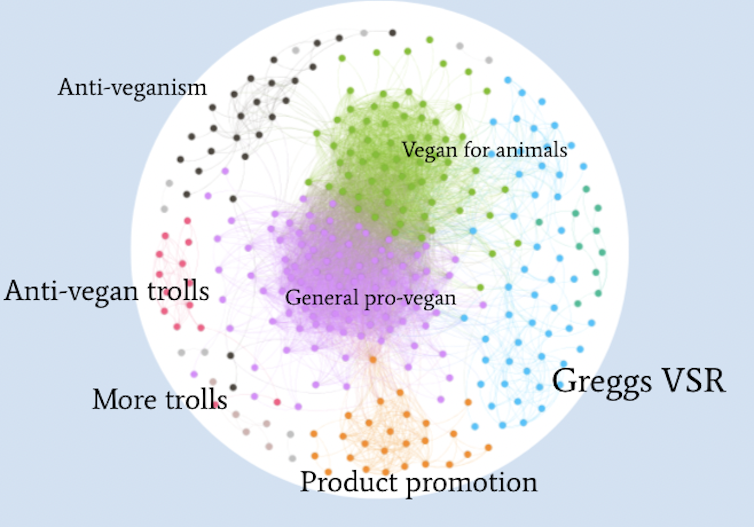Taha Yasseri, University College Dublin and Mary Sanford, University of Oxford
Ten years ago, when we ranked the most controversial articles on Wikipedia, George W. Bush was at the top of the list with global warming at number five. The article on global warming has now been re-titled as climate change, but this remains among the most polarising issues of our time – and one frequently debated on social media.
This might seem like it’s due to the way climate change is often presented primarily as a political issue: something you can choose whether or not to support. But perhaps it’s as much a result of the way social media works. Our recent research shows that polarisation on social media is mathematically inevitable.
What’s more, this polarisation is allowing online discussions about climate change to be overridden by culturally-focused arguments about things like diet. This appears to be further cementing the idea that climate change is a matter of ideology, making it harder to convince people to support action to tackle it.
The fact that it’s so easy to unfriend or unfollow people you disagree with on social media has accelerated the formation of online echo chambers to the extent that even an algorithmic tool designed to break the bubbles won’t be able to help.
Don’t get us wrong: we’re big fans of social media and most likely have already tweeted this article by the time you read it. Social media can be seen as a marketplace of ideas, providing an open forum to exchange facts and opinions and, importantly for scientists, to inform the public about their research. But polarisation can ruin it for everyone.
An example of this relates to the UK bakery chain Greggs’ vegan sausage roll, which ignited days of social media turmoil when it was introduced to the UK in January 2019 to coincide with Veganuary, a month-long UK-based charity campaign designed to encourage veganism. Veganuary-oriented social media discussions that year were dominated by arguments over the sausage roll’s relative merits.
To understand the extent of this interference, we analysed about half a million tweets posted between 28 December 2018 and 28 January 2019 containing any of the hashtags “#vegan”, “#veganuary” and “#veganuary2019” to map out the prevalence of extreme opinions among the tweets.
Around 30% of the tweets we analysed were firmly pro-vegan, while 20% of tweets used Veganuary-related hashtags to express their protest against veganism. More importantly, many Twitter users who tweeted about Veganuary explicitly said if it wasn’t for the Greggs story, they wouldn’t have gotten involved.
On one hand, bringing extra attention to the campaign might be considered a blessing. On the other, the polarised nature of online arguments disproportionately focused on the issue of the vegan sausage roll.
This shifted what could have been a fruitful and logical discussion around the pros and cons of veganism towards unproductive fights centred around perceived threats to people’s identities tied up with what they do or don’t eat and what that means. Many quickly took sides, refusing to engage in conversation and instead attacking the personal qualities or intelligence of the “other side”.
This conflict surfaced again on social media a few months later, when the Intergovernmental Panel on Climate Change (IPCC), a UN-endorsed organisation, published its Special Report on Climate Change and Land in August 2019. In order to gauge the level of public engagement with the report, we collected all tweets sent in August 2019 which contained the phrase “IPCC”. We then used software to analyse the content of some 6,000 tweets in English in order to extract the main topics of discussion.
We found that not only were a large portion of the tweets in response to the IPCC report specifically about diet, but these tweets contained the most toxic and polarised language in the sample. This is even more surprising when considering that diet was only mentioned briefly in the original IPCC report, without any explicit recommendations about meat or dairy consumption.
Evidence like this suggests that diet and cooking are now forming the core of a new culture war around climate.
This could be catastrophic for climate action. Politicians and policy makers traditionally tend to avoid issues that are culturally controversial, and polarisation of public opinion has been shown to weaken politicians’ accountability when it comes to making major decisions.

Our work recently published in Climatic Change shows how tools such as computational topic modelling and sentiment analysis can be used to monitor public discourse about topics like climate events, diet and climate policies. This could help policymakers plan more engaging communication strategies: in other words, to help them read the room.
Both scientists and science communicators who discuss reports like that produced by the IPCC must understand, and anticipate, the likelihood of emotionally charged, potentially negative responses to such polarising issues as climate change – as well as specific areas of polarisation, such as diet, that are currently more popular. This way, they can work to communicate key information in ways that allow readers to focus on what really matters.
Taha Yasseri, Associate Professor, School of Sociology; Geary Fellow, Geary Institute for Public Policy, University College Dublin and Mary Sanford, PhD Candidate in Social Data Science, University of Oxford
This article is republished from The Conversation under a Creative Commons license. Read the original article.












